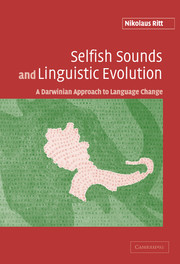Book contents
- Frontmatter
- Contents
- List of figures
- Preface
- 1 Introduction
- 2 The historical perspective
- 3 Approaching ‘language change’
- 4 The Darwinian approach
- 5 Generalising Darwinism
- 6 Towards an evolutionary theory of language
- 7 What does all this imply for the study of language change?
- 8 How to live with feet, if one happens to be a morph-meme
- 9 The prosodic evolution of English word forms or The Great Trochaic Conspiracy
- 10 Conclusion
- References
- Index
7 - What does all this imply for the study of language change?
Published online by Cambridge University Press: 22 September 2009
- Frontmatter
- Contents
- List of figures
- Preface
- 1 Introduction
- 2 The historical perspective
- 3 Approaching ‘language change’
- 4 The Darwinian approach
- 5 Generalising Darwinism
- 6 Towards an evolutionary theory of language
- 7 What does all this imply for the study of language change?
- 8 How to live with feet, if one happens to be a morph-meme
- 9 The prosodic evolution of English word forms or The Great Trochaic Conspiracy
- 10 Conclusion
- References
- Index
Summary
We have now established that it is both possible and plausible to approach the study of languages and their developments in technically (rather than metaphorically) Darwinian terms. Since the argument has involved issues which appear to be only remotely related to our central object of study, it might be helpful to sum up where we have arrived before re-focusing on language.
The starting point of our discussion was that languages change, and that some of the ways in which they change can be described systematically and look amenable to rational explanation. The assumption was that the ways in which languages change may tell us something about their nature, and that a theory of language which could account for them would be preferable to one which could not. We started to search for a perspective on language that could adequately deal with its historicity, and a discussion of the ontology of language, viewed as a spatio-temporally bound and ultimately material ‘world one’ phenomenon was launched. It was established that languages were, at least for historical purposes, best regarded as cognitive, mental and ultimately neuronal configurations in the mind-brains of human individuals. We then discussed the processes by which such configurations are acquired and transmitted and the reasons why they often result in change. It turned out that the types which the processes represented were not special to the domain of language. This motivated excursions into evolutionary biology, cognitive science and the theory of complex adaptive systems.
- Type
- Chapter
- Information
- Selfish Sounds and Linguistic EvolutionA Darwinian Approach to Language Change, pp. 230 - 239Publisher: Cambridge University PressPrint publication year: 2004



